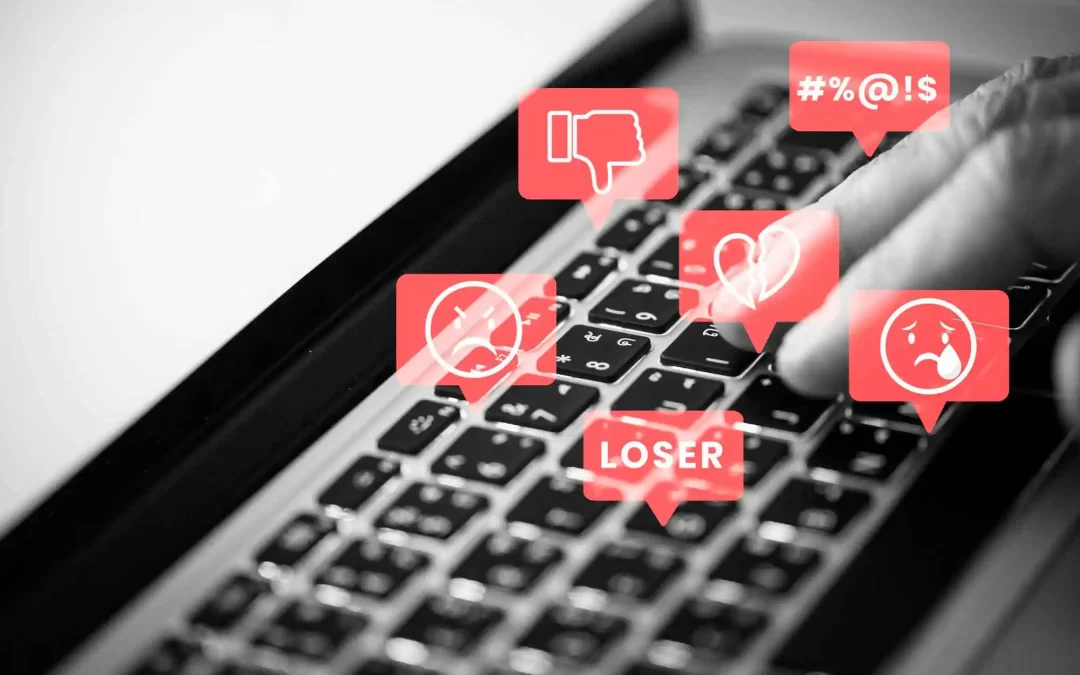In today’s digital age, the threat of having private, intimate images of yourself posted online is an ever-present danger that can leave victims feeling vulnerable and confused about their next steps. Understanding how to handle such a situation is crucial for reclaiming control and protecting your rights. Whether you’re a student whose image was shared around school, an ex-partner posted an explicit video of you online, or your account was hacked, knowing what to do if someone is blackmailing you with photos or videos can empower you to take decisive action. Regardless of its origin, sharing intimate images without your consent is classified as revenge porn and is illegal.
Understanding the Distribution of Intimate Images Without Your Consent and Your Rights
Recognizing Sexual Misconduct and Cyber Sexual Harassment
Cyber harassment, a form of online bullying, often involves threats or coercive tactics, such as blackmail, to intimidate or manipulate individuals. Recognizing the signs of cyber harassment is the first step in protecting yourself. It might involve repeated, unwanted communication, distribution of personal information or images, or attempts to shame you publicly. If someone uses personal photos to threaten or coerce you, it is a clear indication of sexual cyber harassment and revenge porn. Understanding these actions can help you identify when your legal rights are being violated and the steps you can take. This understanding is fundamental to reclaiming your power and protecting your mental and emotional well-being.
Is the Distribution of Intimate Images Without Consent a Form of Blackmail?
The distribution of intimate images without consent can be a form of blackmail, depending on the circumstances. Blackmail typically involves threatening to reveal sensitive or damaging information unless the victim complies with specific demands, such as providing money, performing an act, or refraining from specific behavior.
Blackmail typically differs from revenge porn in its intent and aftermath. Revenge porn involves the nonconsensual distribution of intimate images or videos of another person. These images or videos are often shared with the intent to humiliate, shame, or harm the victim. The main objective is not always to request money or other benefits, as seen in cases of extortion or blackmail.
Although both entail severe privacy violations and are illegal in many jurisdictions, they differ mainly in the type of threat posed and the intent driving the act.
There are instances where blackmail and non-consensual image-sharing may intersect. For example, if someone threatens to share your intimate images unless you comply with their demands, this constitutes an act of blackmail.
Examples of Distribution of Intimate Images Without Consent (Revenge Porn):
Revenge porn can manifest in various ways. Some of the most frequent cases of nonconsensual pornography arise from:
- Angry past (or present) romantic partners seeking to shame you by sharing your intimate photos by sending them to other people or sharing them online,
- Leaked sexts and
- Hacked private nude photos.
Conversely, not every situation constitutes non-consensual pornography. The following examples illustrate scenarios that do not qualify as the distribution of intimate images without consent:
- Consensual Paid Pornography
- Authorized Use or Release of Photos
- The Impact on Victims
Being the victim of nonconsensual image sharing or image-based abuse can have profound emotional, social, legal, and financial consequences. Victims often experience intense shame, anxiety, depression, and even PTSD due to the breach of trust and privacy. The financial burden of legal representation, therapy, and reputation management can be significant, and some victims endure blackmail or extortion. This violation also exposes victims to harassment, stalking, and safety risks while straining personal relationships and eroding self-esteem and confidence. Addressing these impacts highlights the importance of prevention, justice, and comprehensive victim support.
Domestic abusers and sex traffickers often employ nonconsensual pornography as a means to harass and exert control over their victims. Many times, women and girls are the victims.
Understand the Legal Framework
Legal Rights Against Revenge Porn
Understanding your legal rights against revenge porn is pivotal in addressing and mitigating the harm. These acts are considered criminal offenses in many jurisdictions. If someone is blackmailing you with photos, it is essential to know that you are protected under the law and that there are specific legal provisions to address such crimes.
If you’re being blackmailed with photos under Florida law, the situation falls under several potential criminal statutes, including extortion, cyberstalking, and harassment. Here’s how to handle it legally in Florida:
Under Florida law:
- Sexual Cyberharassment (§ 784.049, Florida Statutes): Known as Florida’s “revenge porn” law, it criminalizes the intentional distribution of intimate images without consent.
- Unauthorized Promotion of a Sexually Explicit Image (§ 836.14(4), Florida Statutes): Unauthorized Promotion of a Sexually Explicit Image involves the willful promotion of an image depicting nudity or sexual conduct of an identifiable person without their consent, primarily for financial gain.
- Cyberstalking (§ 784.048, Florida Statutes): Repeated online harassment, including threats or coercion, is a form of stalking and can be charged as a misdemeanor or felony, depending on severity.
- Extortion (§ 836.05, Florida Statutes): It is illegal for anyone to threaten harm, including exposing private images, to coerce you into doing something. This is a second-degree felony punishable by up to 15 years in prison.
Victims may also have the right to seek legal help for revenge porn and cyber sexual misconduct under civil laws. The civil claims may include intentional infliction of emotional distress, cyber harassment, copyright infringement, privacy torts, stalking, and extortion. Revenge porn and cyberbullying attorneys can guide you through the process, ensuring that your rights are defended and that justice is pursued. Empowering yourself with this knowledge can significantly enhance your ability to take action against perpetrators.
What if the Perpetrator is Under 18 years old?
If an underage individual shares explicit images of you without your consent, the legal standard becomes more stringent. While adults can be held accountable for nonconsensual pornography if they reasonably should have known their actions were harmful, minors are only liable if they knew and intended to cause harm.
To prove an underage perpetrator committed nonconsensual pornography, a plaintiff must prove the following elements are actual:
- A reasonable person would understand that the image they obtained should have remained private;
- The defendant knew or should have known that the plaintiff did not consent to the content’s publishing; and
- The defendant knew that publishing the content would harm the plaintiff.
Steps to Take if Someone is Blackmailing You with Photos
If you find private, intimate images of yourself online, try to stay calm and remind yourself that the blame lies entirely with the perpetrator—not you. Taking the photo or video yourself does not imply you consented to it being shared publicly. If someone is attempting to blackmail you using these images, it’s crucial to remain composed and approach the situation strategically to safeguard yourself and reduce potential harm. Follow these steps:
- Save all communications. Take screenshots of messages, emails, or any other interactions.You will want to look for instances of the Images online. An attorney can also help assist with this.
- Record details. Include dates, times, and platforms used for communication.
- Preserve the evidence. Do not delete messages or photos, as they can serve as proof if you involve authorities. Changing passwords and securing your online accounts is also advisable to prevent the blackmailer from accessing more of your personal information.
*Do not save copies of the content as evidence if you were a minor when the picture or video was taken. If you were a minor when the picture or video was taken, the content would be classified as child pornography. Note the location of the image and where the image came from. Then, reach out to a local prosecutor or file a criminal complaint to assess the potential criminal consequences of the perpetrator. An experienced attorney can assist you with this.
Reporting the Misconduct
Reporting is a crucial step in stopping perpetrators and preventing further harm. When faced with threats, immediate reporting can prevent escalation and deter offenders. By notifying law enforcement, you protect yourself and contribute to broader efforts to combat cyber crime. Authorities are equipped to investigate these offenses and can provide resources and protection during the process. Documentation of threats and communications is vital, as it serves as evidence that can be used in legal proceedings. By taking action, you reaffirm your rights and play a part in upholding justice for yourself and others in similar situations.
- Submit Removal Request to Search Engines: Request content removal through the reporting portal of the search engine (Google, Bing, etc.).
- Report to the Relevant Platforms: If the person uses social media, messaging apps, or adult websites, flag the content for removal and report their profile and the conversation to the platform.
- File a Police Report: Visit your local police station or contact them via a non-emergency number to report the incident. Provide all evidence you’ve gathered.
- Consider specialized organizations: Depending on your location, you may have access to cybercrime units or organizations like the National Center for Missing & Exploited Children (NCMEC) if the situation involves minors.
Seeking Legal Help from an Experiences Revenge Porn Removal Attorney
Legal professionals bring essential expertise to navigate the complexities of cases involving revenge porn, cyberbullying, and sexual misconduct. They assist in filing police reports, securing restraining orders, and initiating civil actions against perpetrators. Lawyers specializing in cyber harassment and blackmail provide tailored advice, helping to reduce risks and exposure. Acting promptly is crucial, as swift legal intervention can prevent further harm and lead to a quicker resolution. Professional legal support provides the confidence to navigate these challenges and ensures that your interests remain a top priority.
A Florida-based attorney with a focus on cybercrime, revenge porn, or cyber harassment can guide you. They may help by:
- Pursuing a criminal complaint through assistance in filing a police report.
- Seeking injunctive relief (restraining order) to prevent further distribution.
- Pursuing Digital Takedown Efforts like takedown notices to have content removed from websites.
- Guiding you on maintaining privacy throughout your case.
Additional Steps to Consider:
- Avoid paying money or doing what they demand. This often encourages them to continue or escalate the blackmail.
- Don’t engage with the perpetrator any more than necessary. Document all communications and threats meticulously. Screenshots, emails, and messages should be preserved as they can serve as critical evidence. Seek legal counsel on how to move forward with communication.
- Stay calm and avoid reacting emotionally. This helps you think clearly.
- Strengthen your Digital Protection. Strengthen privacy settings on all social media platforms. Change your passwords and enable two-factor authentication (2FA). Warn close contacts not to interact with suspicious profiles.
If you or someone you know has been a victim of image-based sexual abuse, harassment, or other forms of cyber sexual misconduct, I, Attorney Sydney Rendel, am here to help.
With a combination of legal expertise and personal understanding, I provide compassionate guidance, tailored strategies, and steadfast support to help victims reclaim their dignity and seek justice. My commitment to empowering clients and holding perpetrators accountable ensures you won’t face these challenges alone. Contact me today to discuss how I can help support you through the legal process.












